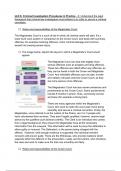Unit 6: Criminal Investigation Procedures In Practice - A: Understand the legal
framework that criminal law investigators must adhere to in order to secure a criminal
conviction.
Roles and responsibilities of the Magistrates Court:
The Magistrates Court is a court of law in which all criminal cases will start. It's a
lower level court system in comparison to the Crown Court, and deals with summary
offences, for example motoring offences, minor criminal damage and common
assault not causing severe injury.
The image below, depicts the layout in which a Magistrate’s Court would
appear
The Magistrate Court can deal with slightly more
serious offences such as burglary and drug offences.
These two offences are called either way offences, as
they can be heard in both the Crown and Magistrate
Court. Any indictable offences such as rape, murder
and robbery will pass onto the Crown Court, as they
are more serious crime offences.
The Magistrate’s Court has less severe sentences and
punishments to the Crown Court. Some punishments
include 6 months in prison, fines, community service
and bans (for example a driving ban).
There are many agencies within the Magistrate’s
Court, who work to make the court case move along
smoothly and secure a criminal conviction. Firstly, the
Magistrates, once referred to as the Justice of the Peace, are 2 or 3 people who
have volunteered their services. They aren’t legally qualified, however, receive legal
advice by the qualified court advisors (clerks). The Clerk is an individual who comes
from a legal background, they ensure the Magistrates have all the necessary
information from the Lawyers. This information will be used to prove the defendant is
either guilty or innocent. The Defendant, is the person being charged with the
offence. However, until enough evidence is supported, the individual remains
innocent until proven guilty. There are the Witnesses, who provide evidence which
supports either the defence or the prosecution. Lastly, are the Ushers, who introduce
the case and work to make sure the trial runs smoothly and fairly.
Roles and responsibilities of the Crown Court:
, The Crown Court is a court of law in which a jury will conclude the verdict and the
judge will decide on the sentence the individual being prosecuted will get. It's a
higher level court system in comparison to the Magistrate’s Court, and deals with
indictable offences, for example murder, rape and burglary. The Crown Court can
also deal with appeals against a Magistrate’s Court convictions or sentences and
any cases passed from the Magistrate's Court for trial or sentencing.
The image below, depicts the layout in which a Crown Court would appear
The Crown Court has more severe
sentences and punishments than the
Magistrates Court. Some punishments
include community sentences and prison
sentences up to life imprisonment.
There are many agencies within the Crown
Court, who work to make the court case
move along smoothly and secure a
criminal conviction. Firstly, the Judge
oversees the trial and makes sure all
parties have the opportunity to present
their case fairly, from the prosecution and defence. In addition to this, once the jury
has said the verdict, the Judge is responsible for giving a reasonable sentence or
punishment. The Count Clerk is an individual who sits at the front of the court, and
prepares the laptops/screens to present the evidence during the trial. In addition to
this, they read formal charges to the court and take oaths from the jury. The
Defendant, is the person being charged with the offence. However, until enough
evidence is supported, the individual remains innocent until proven guilty. There are
the Witnesses, who provide evidence which supports either the defence or the
prosecution. Lastly, are the Ushers, who introduce the case and work to make sure
the trial runs smoothly and fairly. The Probation Officer will provide risk assessments,
advise on bail/sentencing. Lastly, is the Jury, they are made up of 12 members of the
public. They listen to the evidence presented to them during the trial, they conclude
the defendant is guilty or innocent of the offence and conclude the verdict.
Explain the criminal law that applies to crimes against a person, property and public
order.
A property:
Crimes against properties are offences which deprive a person's ownership of
property or the destruction of property without consent. Examples of this include
forgery, robbery, embezzlement and extortion. These examples are crimes against a




